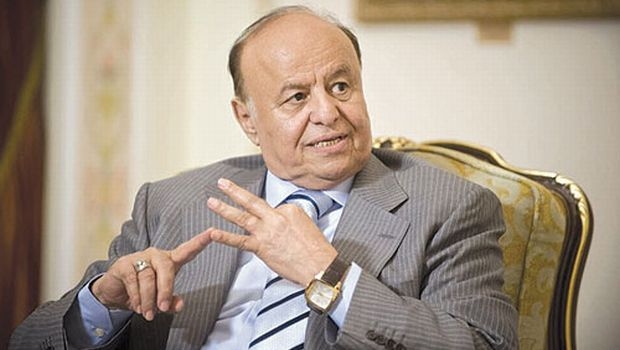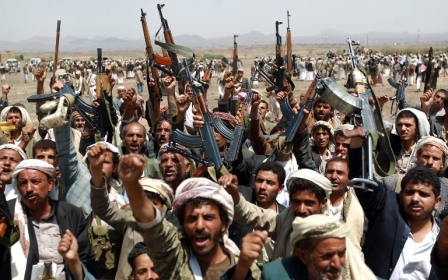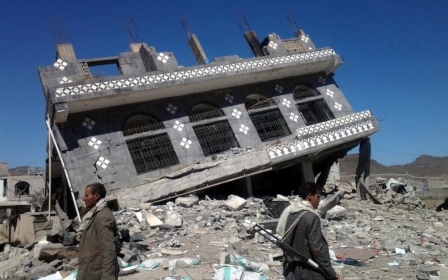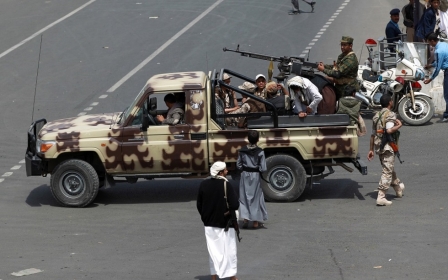Yemen's President: 'Security co-ordination' with Egypt needed to stamp out terror

The President of Yemen stressed the importance of security co-ordination with Egypt to combat terrorism in the region, speaking during a televised speech on Saturday.
President Mansour Hadi, who rules over a country currently riven by battles between Houthi rebels and al-Qaeda fighters, gave his condolences for Friday’s attacks on Egyptian armed forces in the Sinai, which left at least 30 soldiers dead.
Hadi told viewers of his “great and deep sadness” on hearing news of the attack, during which militants rammed an army checkpoint with a car packed with explosives, confirming that Yemen’s “leaders, government and people stand in solidarity with our brothers in Egypt.”
He used the speech to stress “the importance of security co-ordination” between Egypt and Yemen to root out “the terrorist elements that harm safety and stability.”
The speech came less than a week after Yemeni authorities agreed to release dozens of Egyptian fishermen, who were detained in early October over allegations they illegally entered Yemeni fishing waters off the western port city of Hodeida.
Hadi: Houthis must withdraw ‘without delay’
Turning towards domestic issues in a speech on Sunday, Hadi launched a strongly-worded attack on the Houthi rebels who have been in control of the capital Sana’a on 21 September.
He was speaking during a televised speech from the presidential headquarters in Sana’a, after meeting with the national defence council and the presidential advisory body.
Hadi slammed the Houthis, whom he accused of armed “occupation of ministries, state institutions and oil companies” in the capital.
He demanded that they withdraw from their positions in Sana’a “without delay”, warning the armed rebels not to “escape from responsibility and create pretexts for occupying” Yemeni cities.
Despite the speech, the Houthis continued their advance in central Yemen, traditionally a stronghold for al-Qaeda and tribesmen fighting alongside them.
The rebels moved into the Masaneh region of the central Bayda province, laying siege to the house of al-Qaeda leader Nabil Dhahab.
The Houthi advance was backed by rocket fire launched by the Yemeni army and the Presidential Guard, Reuters reported.
Yemeni army alone to combat “terrorism”
During his speech on Sunday, President Hadi stressed that Yemen’s army and security services are the only bodies responsible for combating “terrorism.”
Hadi did not mention any specific group by name as he stressed the importance of rooting out “terrorism” from the country.
However, he did speak of the army’s success in the provinces of Shabwa and Abyan, in reference to a large-scale campaign launched in May by Yemen’s armed forces in an effort to combat al-Qaeda in the Arabian Peninsula (AQAP).
The speech appears to contradict reports suggesting that Yemen’s armed forces were co-ordinating with Houthi rebels in the fight against AQAP in central provinces.
Reports on Sunday of Yemeni army support for the Houthi advance come after a tribal source told AFP on Saturday that the rebels, who incurred significant losses in clashes with AQAP fighters and local tribesmen in Bayda province, had been backed by artillery units from the Yemeni army.
The Yemeni state has been battling AQAP fighters for years, and has also been rocked by recent months by the lightning advance of Houthi rebels, who have been advancing southwards from their stronghold in Saada, northern Yemen.
The rebels have taken control of several of the country’s key cities and strategic sites – their current push to advance further into central Yemen has meant it is now in direct combat with AQAP fighters, who are opposed to what they call the Houthis’ “Shiite expansion.”
New MEE newsletter: Jerusalem Dispatch
Sign up to get the latest insights and analysis on Israel-Palestine, alongside Turkey Unpacked and other MEE newsletters
Middle East Eye delivers independent and unrivalled coverage and analysis of the Middle East, North Africa and beyond. To learn more about republishing this content and the associated fees, please fill out this form. More about MEE can be found here.




